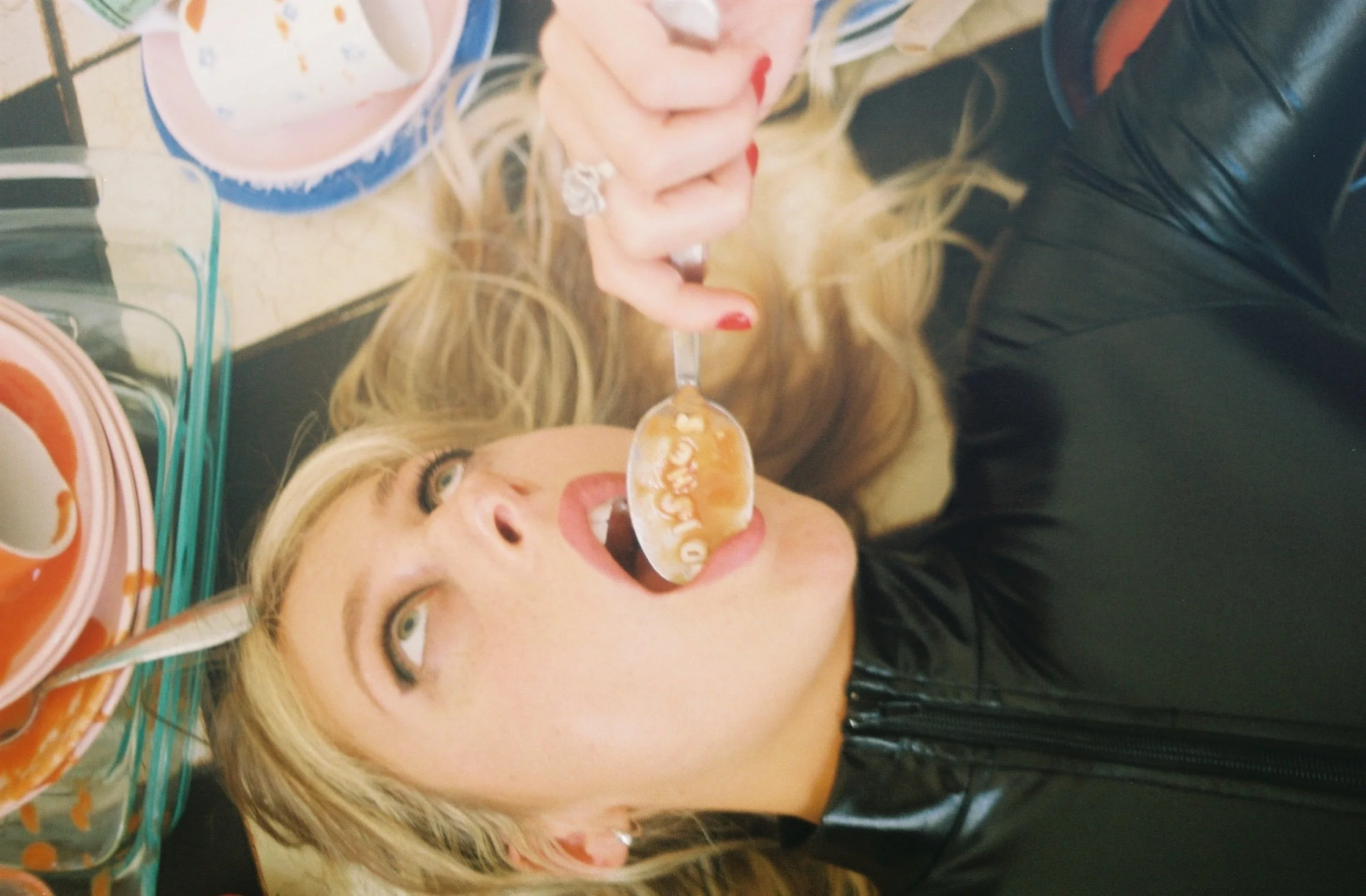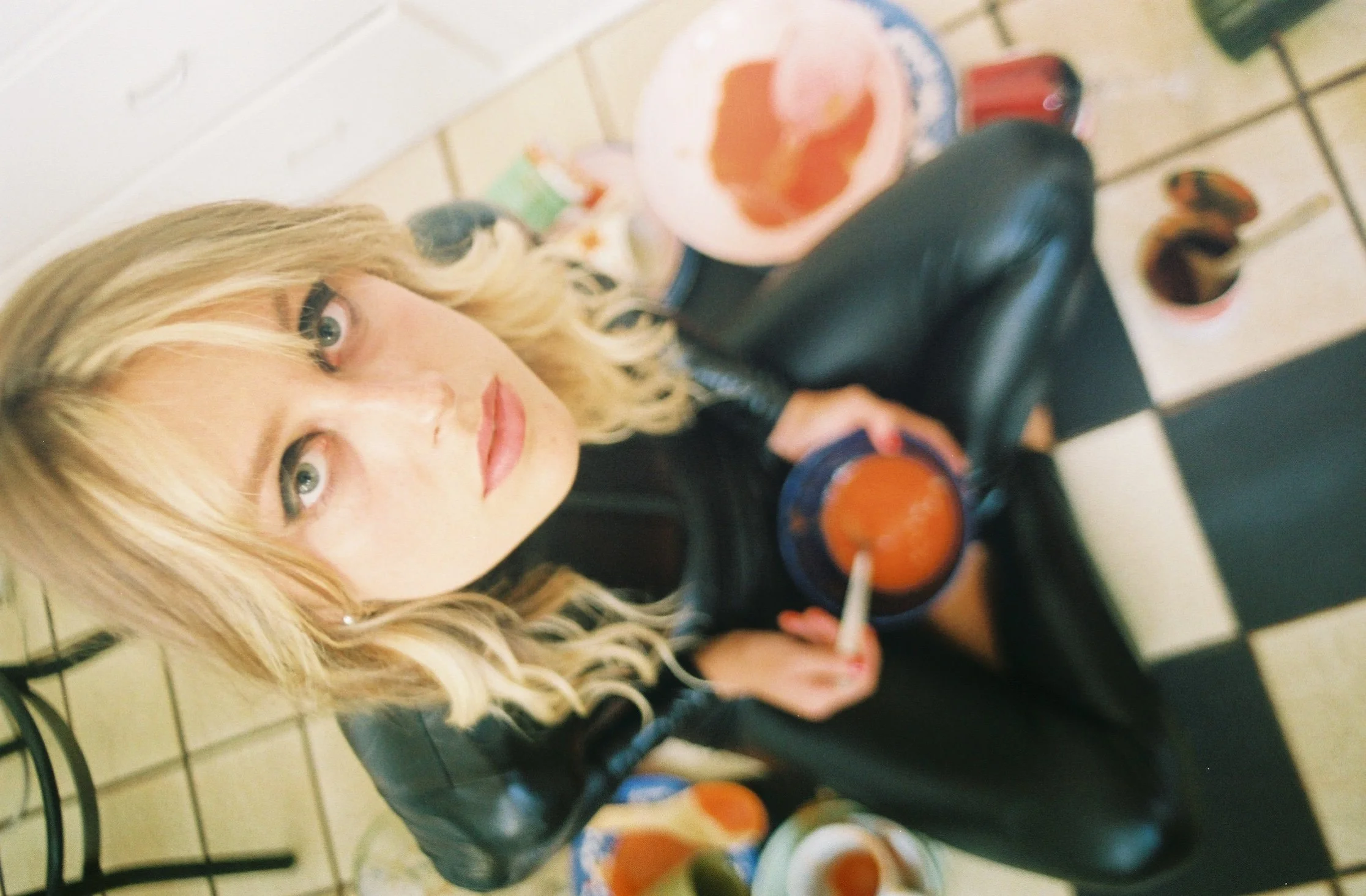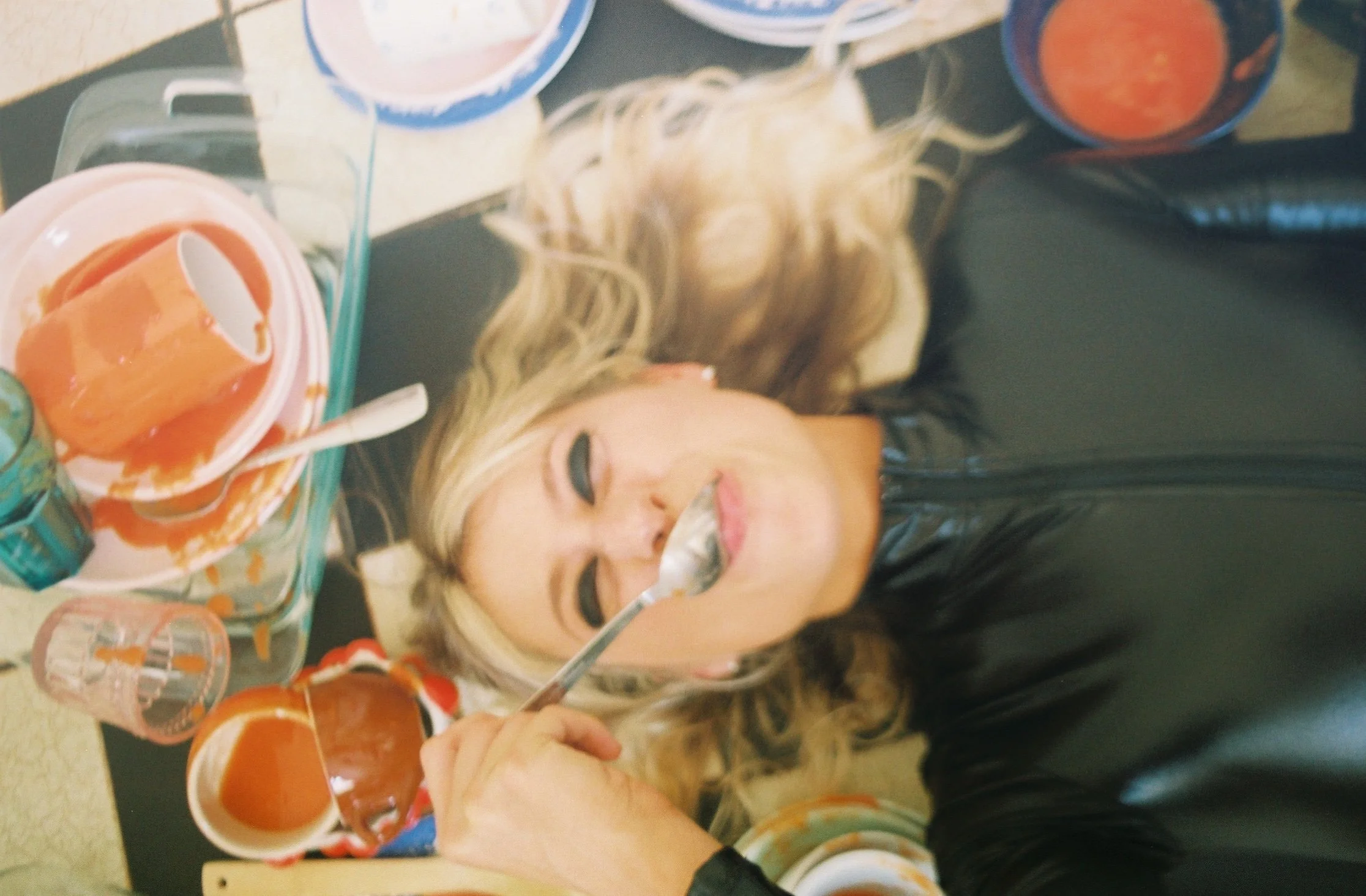West Of Venus
Andrea Nayeli interviews Unknown Venus
From The Winter Solstice Issue No. 4

It was ninety-four degrees in Chicago, Illinois—the hottest day of the summer. Seventeen-year-old law intern Annie Lancaster kept herself comfortably cool and busy at work in her firm’s office until she received a call from her friend, panting from pure teenage exhilaration. “Cherry Glazerr is performing at Subterranean tonight! What time do you get off?” Suddenly, Lancaster was no longer concerned with staying cool, or playing it cool. Corporate uniform and all, she ran straight from her boss’s office to the show.
Tying up her dress and stepping into a pair of her friend’s athletic shorts, Lancaster made her way through the historic venue, heading directly towards the mosh pit already stomping on Subterranean’s checkered floors. That’s where she became delightfully overwhelmed by Clementine Creevy’s magnetic verve, the free-spirited Los Angeles native and, by Lancaster’s account, wonderfully bizarre lead singer of then up-and-coming garage rock band Cherry Glazerr. “I was so inspired,” Lancaster recounted dreamily as she recalled the impact of the sweaty August evening seven years later. "She was so weird, in the best way.”
These days, twenty-four-year-old Lancaster—otherwise known as Unknown Venus—is a Los Angeles-based singer, songwriter, and instrumentalist with no current plans to pursue a law degree, or anything but music, for that matter. We met up on another perfect day in the City of Angels. Lancaster, who presented as a sun-kissed angel in an “I love New York” crop top and a low-rise, flowing skirt, greeted me from atop her driveway with all the warmth of an old friend emblazoned by the heat of the hot October sun. Lancaster cracked open a Celsius energy drink at the start of our conversation, which probably began around four in the evening. This afternoon ritual wasn’t unusual for Lancaster, who was used to caffeinating and creating while the rest of the world slept. “I used to write my songs at, like, two in the morning… so all my original demos are essentially whispered tunes,” Lancaster said of her somewhat stifled songwriting process, at least, as it was when she first moved to Los Angeles and lived in a suspiciously sleepy part of West Hollywood, by West Hollywood standards.

Even so, “whispered tunes” in WeHo was a more daring venture than teenage Lancaster, who frequented countless concerts and festivals without telling a soul just how much she saw herself center stage, could have imagined. “I wouldn’t talk about it.” She confessed, remembering a time when she was so quiet about her musical aspirations that hardly any of her friends knew how she related to the artists they admired, let alone that she could carry a tune. The truth was that with her classical choral background, a stint with the Chicago Harp Ensemble, and a proclivity for all things music-related, Lancaster was and has always been capable of much, much more.
Now, things are different. Whether it is the all-women’s pool league that she recently joined or just the nature of growing up, Lancaster feels more confident and self-assured than ever. While she might still be a self-proclaimed night owl, she is no longer afraid to make some noise, which she has been doing a lot lately. At the time of this writing, and within a short span of just five months, the singer-songwriter has released three singles as Unknown Venus. When I asked about her songwriting, Lancaster described a process of sudden involuntary delivery, “I feel like it’s other things being channeled through me,” she explained, “It’s not necessarily my own thoughts in the first place.” She referenced her third and latest single, The Worst, which came from a voice memo recording of a melodic idea that she had, seemingly out of the blue, while driving. “There’s definitely an element of the subconscious…Songwriting is dreaming,” she concluded.
Much like a dream, Lancaster’s list of inspirations and influences for The Worst, unveiled itself as an abstract collage of seemingly random information: a young Natalie Portman as Mathilda in Léon: The Professional, dive bar color schemes, superheroes, personal experiences. But for Lancaster, it all connected effortlessly when she put pen to paper. She said she tends to write songs from start to finish in “one fell swoop,” hardly returning to edit the end result. She understood the rarity of her gliding disposition, accounting for the efficiency of her undertakings with victories of personal growth. “I’m a lot less self-critical,” she stated, “I don’t feel like I need to impress people anymore.”

Maybe that is why The Worst, released in October of 2023, just days after we met, is so different from her first two singles. At the very least, Dried Out and Dishes, released in June and September of 2023, are arguably more widely accessible by societal standards, in that they are more heavily produced, upbeat tracks sometimes bordering on hyperpop. The Worst, by contrast, is a letter of contempt manifested in gentle alt-rock tones that sound stripped down and even tender, if not for a more relaxed approach to production, then for the raw quality of restored resolution in Lancaster’s voice. Lancaster, of course, knows better than anyone just how different these songs really are, especially in terms of their subliminal messages and subject matter. Though she was carefully concise in her delivery of such information. “I hate to assign meaning to songs, in case it might ruin someone else's interpretation,” she hesitated, later landing on a general analysis she felt comfortable sharing; “The first two were the processing of experiences that drain your energy… They were still in the experience. Whereas, The Worst is post-experience,” she revealed, adding, “the first two are down-bad. The Worst is not.”
It’s true—upon listening to the track, it becomes immediately obvious that The Worst is more down-bad, or at the very least, bubbling between the lines. Lingering in the cathartic aftermath of heartache, The Worst’s lyrics stand out as empowered revelations about misplaced anger, reassigned fault, and reflective epiphanies, conveyed through the use of sensory-driven language that both decorates and drives Lancaster’s signature storytelling style. As for the aftermath of the track’s release? Lancaster wants her listeners to feel vindicated by the single, though she ultimately felt hope—“hope for myself,” she emphasized—while writing it.
Lucky for us listeners, it seems that hope is here to stay. There is a general tone of positivity to everything Lancaster says, and when asked about the future, she is quick to describe the details. In the next few months, she will release a handful more tracks; eventually, she will perform in arenas. As an up-and-coming artist herself, Lancaster remains to this day most heavily influenced by female artists like Cherry Glazerr’s Clementine Creevy, who “aren’t afraid to be extremely unconventional,” and, for lack of better words, “are just feeling things.” Lancaster hopes that one day, her listeners will relate to Unknown Venus as much as she relates to the visionary artists on her roster of musical role models. But for right now, she is largely focused on the present and is “not hyper-concerned,” about what is to come. “I can just trust in it,” she noted to me in a moment of gratitude, revealing that at the end of the day, she is just happy her art exists. For Unknown Venus, “that can be enough,” proving that the twenty-something, Los Angeles-artist version of Lancaster has stayed as gracefully humble as a Midwestern cliché. But from where I’m standing—all freshly lit up by her unapologetic glow—it seems she is also not far off from the very women she admires.

